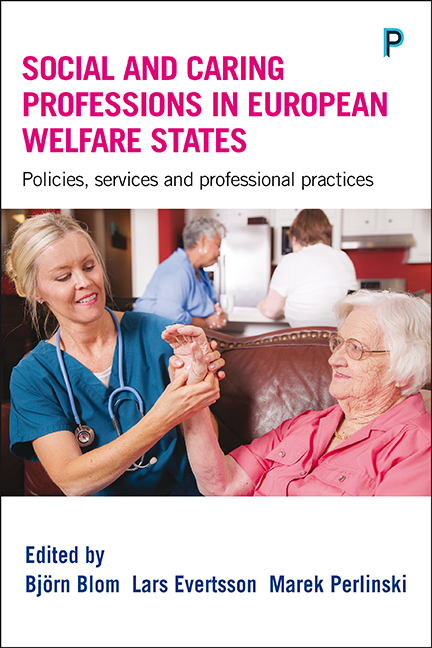 Social and Caring Professions in European Welfare States
Social and Caring Professions in European Welfare States Book contents
- Frontmatter
- Contents
- List of tables and figures
- Notes on contributors
- Preface
- one European social and caring professions in transition
- Part 1 Knowledge, reflection and identity in the social and caring welfare professions
- Part 2 Control, regulation and management
- Part 3 Collaboration, conflict and competition
- Part 4 Assessment, negotiation and decision making
- Index
three - The construction of professional identity in social work: experience, analytical reflection and time
Published online by Cambridge University Press: 05 April 2022
- Frontmatter
- Contents
- List of tables and figures
- Notes on contributors
- Preface
- one European social and caring professions in transition
- Part 1 Knowledge, reflection and identity in the social and caring welfare professions
- Part 2 Control, regulation and management
- Part 3 Collaboration, conflict and competition
- Part 4 Assessment, negotiation and decision making
- Index
Summary
Introduction
In their journeys towards becoming and developing as professionals, social work students and practitioners form a range of beliefs and attitudes about the profession. Norms and values are embedded in various knowledge bases, crucial for work performance, and are also noticeable in social and educational policies framing professional practice. Several components influence the professional development of every practitioner. Simultaneously, professionals develop understanding of their professional boundaries and how they may interact with others through interprofessional cooperation. Their set of beliefs, attitudes and understanding about their roles, within the work context, is generally referred to as their ‘professional identity’. We consider professional identity and its construction as ‘a lifelong process’, influencing the kinds of knowledge demanded in education and in practice. This process of construction itself implies that professional identity is an ‘interactional accomplishment’ that can ‘only be understood as process, as “being” or “becoming”, never a final or settled matter’ (Jenkins, 2004, p 6).
From this point of departure, it is crucial to investigate how these constructing processes proceed in different fields and at different levels. This chapter aims to provide a contribution to filling gaps in understanding these reflective processes by demonstrating how various components are involved in the process of identity construction. Drawing on several examples from Denmark, England and Norway, we identify how this process involves the construction of experience, analytical reflection and time across the field of education and practice and in reflection over theory and practice. This process of constructing professional identity is characterised by sensitivity towards interactional and contextual complexity including openness to the ambiguity of knowledge. This contrasts with approaches that presume professional identity and practice are constructed unambiguously. Therefore a major point of the chapter is that social and educational policies offering a simplistic approach can be problematic, by ignoring the complex construction of professional identity. We will discuss this issue at the end of the chapter with reference to the current focus on evidence-based knowledge and practice.
The construction of professional identity
Jenkins (2004) points out in his theoretical discussion of approaches to social identity derived from social psychology (for example Robinson, 1996) and sociology/anthropology (for example Barth, 2000) that individuals and collectivities produce and reproduce ‘identity’ through discourse, narrative and representation, as well as through practical and material processes of identification.
- Type
- Chapter
- Information
- Social and Caring Professions in European Welfare StatesPolicies, Services and Professional Practices, pp. 37 - 52Publisher: Bristol University PressPrint publication year: 2017


